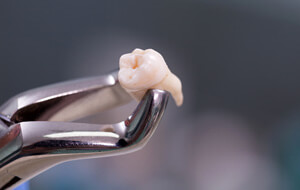Wisdom Tooth Extractions – Jacksonville, FL
Get Rid of Painful, Problematic Wisdom Teeth!

Wisdom teeth can often cause serious problems when they emerge, leading to irritation, swelling, and even outright pain. While some people are more fortunate than others in this regard, many patients come to us feeling like they can’t remove these extra molars nearly fast enough.
If you’re in the Jacksonville area, you’ll be happy to learn that a wisdom tooth extraction from North Jacksonville Complete Dentistry is fast and easy. Make an appointment with us today and we’ll help you get rid of painful, problematic wisdom teeth in a snap!
Why Choose North Jacksonville Complete Dentistry for Wisdom Tooth Extractions?
- Oral Sedation to put Anxious Patients at Ease
- Compassionate Dentists Who Emphasize Patient Comfort
- Dental Team Who Will Attend Closely to your Needs
What Are Wisdom Teeth?

Wisdom teeth are a special term for the last molars to emerge. They typically sprout sometime in early adulthood, and are located far at the back of the mouth. It’s thought that wisdom teeth were useful in an era of human history when people lost many of their molars by adulthood. However, this is no longer the case for most people; in many situations, these teeth cause more trouble than they’re worth.
Why Do Wisdom Teeth Need to Be Removed?

Some people are able to go through their entire life without having any problems with their wisdom teeth. However, these people are in a lucky minority. More often, wisdom teeth cause a bit of trouble when they emerge. They often cause serious misalignment by pushing surrounding teeth out of position, or develop infections due to the difficulty associated with cleaning them. This is if the teeth even manage to emerge at all; many people find that their wisdom teeth become impacted, stuck underneath the gum tissue.
If you find that your wisdom tooth is causing you substantial discomfort, or if it shows symptoms of infection, it’s often a good idea to have them removed.
What to Expect From the Wisdom Teeth Procedure

Extracting a fully emerged wisdom tooth is essentially the same as removing any other. We will numb your mouth completely, then use a special tool called an “elevator” to gently lift the tooth out of its socket. Once that’s done, we’ll use a set of forceps to wiggle the wisdom tooth free. We use powerful anesthetics for this process, ensuring your complete comfort throughout the procedure.
If the wisdom tooth is impacted, it may be necessary to remove it surgically. We will refer you to an expert oral surgeon who will be able to complete this procedure.
Recovering From Wisdom Teeth Extraction

As you might have guessed, patients are often a little bit sore in the days after the wisdom tooth surgery. They may also experience a bit of swelling or bleeding, but this often fades quickly after the procedure is completed.
You can speed up recovery by closely adhering to our instructions for aftercare. In many cases this includes a soft food diet, which can ease the discomfort associated with heavy chewing. You should also avoid drinking through a straw, smoking, or chewing excessively; these can all pull the emerging clot out of place, creating a condition known as “dry socket.”
If you have any other questions about the wisdom tooth procedure, make an appointment for a consultation with us today!
Understanding the Cost of Wisdom Tooth Extractions

We know that wisdom tooth extractions can be a little bit nerve wracking, and we don’t want the financial component of your treatment to contribute to that. For that reason, we do everything that we can to make the financial component of your dental care as easy as it can be.
When we meet, we’ll be sure to give you a thorough estimate for what your wisdom tooth extraction will cost. Until then, here’s what you should know about what this procedure typically costs.
Factors That Can Impact the Cost of Wisdom Tooth Extractions

The reason it can be difficult to tell you what a wisdom tooth extraction is likely to cost without meeting you first is that there are a variety of factors that can influence what you’ll pay. First of all, not everyone has all four wisdom teeth—some patients are born with more or less of them. The fewer wisdom teeth you need to have removed, the less you’ll pay.
Some wisdom teeth are also more complex to remove than others, like if your it’s impacted. There are two kinds of impaction: soft tissue, where the wisdom tooth has at least partially emerged from the gums, and bony impaction, where the tooth is lodged in the jaw. The latter is much harder to deal with and could necessitate oral surgery to fully deal with.
Many people also request sedation during their treatment, the cost of which will also heavily influence what you pay for your procedure as a whole.
Does Dental Insurance Cover Wisdom Tooth Extractions?

Dental insurance isn’t always willing to cover oral surgery, but wisdom tooth extractions are a notable exception to this rule. Most plans will cover at least a portion of this treatment after your deductible has been met, though the exact portion of payment will depend on the particular nature of your plan.
We’ll help you consult with your dental plan and ensure that you’re getting the most of your benefits.
We accept a variety of insurance plans and are happy to help patients connect with financing services if they’re necessary. If you have any questions about what you’re likely to spend for your wisdom tooth extraction or how you can make it affordable, make an appointment at our office today!
Wisdom Tooth Extractions FAQs
How Should I Prepare for My Wisdom Tooth Extraction?
To prepare for a wisdom tooth extraction, start by consulting with us to discuss the procedure, anesthesia options, and any medical conditions you may have. Plan for your recovery by arranging for someone to drive you home and setting aside time to rest afterward. Follow any pre-operative instructions, such as avoiding eating or drinking if sedation is involved. On the day of the procedure, wear comfortable clothing and bring essentials like lip balm. Additionally, stock up on soft foods, ice packs, and pain relievers at home to ensure a smoother recovery.
Is Wisdom Tooth Removal Painful?
Wisdom tooth removal can cause discomfort, but the procedure itself is generally not painful due to local anesthesia or sedation. After the anesthesia wears off, you may experience soreness, swelling, and mild pain. This discomfort is usually manageable with over-the-counter pain relievers, prescribed medications, and proper aftercare. The level of pain varies depending on the complexity of the extraction and individual pain tolerance. Following our aftercare instructions, including rest, using ice packs, and eating soft foods, can help minimize pain and promote healing.
What’s the Best Age to Get Wisdom Teeth Removed?
There’s no set age where wisdom teeth need to be removed, but sooner tends to be better than later. Between 17 and 25, the roots of the wisdom teeth are not fully developed, making the extraction less complicated and reducing the risk of complications. Additionally, younger patients generally heal faster and experience fewer post-operative issues. However, the timing can vary based on individual dental health and the position of the teeth. It's best to consult with a dentist or oral surgeon, who can recommend the appropriate timing based on your specific situation.
When Can I Use a Straw After Wisdom Teeth Removal?
After wisdom tooth removal, it's generally advised to avoid using a straw for at least two or three days, and ideally as long as a week. The suction created by drinking through a straw can dislodge the blood clot that forms in the extraction site, potentially leading to a condition called dry socket. This can severely delay the necessary healing process, in addition to causing a fair amount of discomfort. It's best to follow our specific instructions for you, as we may recommend a different timeframe based on your individual healing process and what we expect your recovery timeline to look like.
